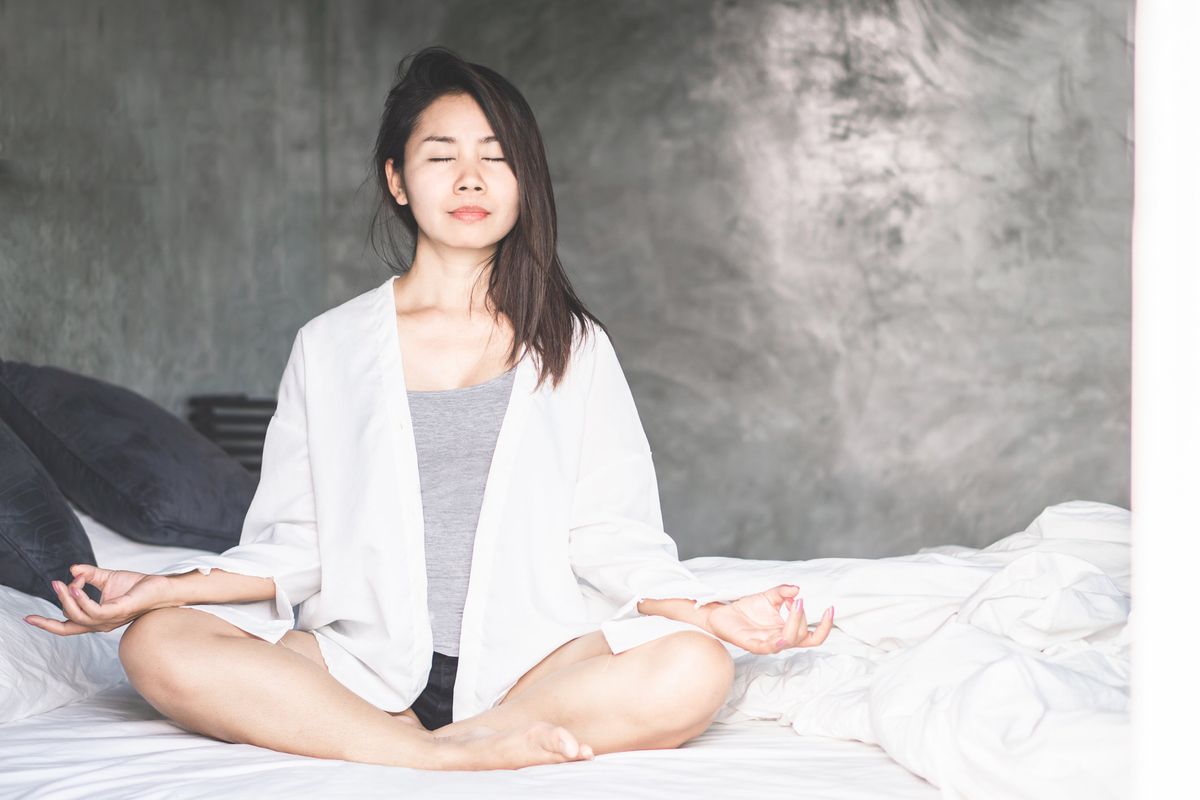
iStock.com/Doucefleur
5 Best Apps to Cultivate a Meditation Habit
Try these apps to help you in your journey
Aug 18, 2021
Jul 25, 2023
Self-Care & Mental Health
Liz is an editor and reporter for a daily newspaper in Northern New England, where she has worked since graduating from the State University of New York at Oswego. Liz, who has chronic migraine disease, enjoys writing about older adults and mental health. She lives in a rural community near her favorite mountain with her husband and two cats.
Full BioLearn about our editorial policies

Try these apps to help you in your journey
I used to journal and meditate every night before bed. It was the perfect way to end often stressful days and allowed me to process my thoughts.
That practice went on the back burner over a year ago when I moved in with my partner, and our nightly routines meshed. My 20-minute journal-and-meditate routine was replaced with streaming shows until I could no longer keep my eyes open.
But as the COVID-19 pandemic continues, it's been harder for me to quell my anxious thoughts, and I've missed my old meditation habit.
"I think the practices of meditation and mindfulness afford you the opportunity to navigate life in a more graceful way," said Dr. Jessica Matthews, assistant professor and director of the Master of Kinesiology in Integrative Wellness program at Point Loma Nazarene University, and a member of HealthyWomen's Women's Health Advisory Council.
That ability is needed more than ever during these turbulent times, with many people experiencing higher levels of anxiety and depression due to the pandemic. Studies have long shown that meditation can help people cope with anxiety disorders and depression.
"Meditation is a type of formal practice centered on cultivating enhanced moment-to-moment awareness. Cultivating the capacity to be fully present plays an important role in improving emotional regulation and reducing stress [and] provides us an opportunity to be more awake in our lives," Matthews said. "It really is not limited by age, by background, by socioeconomic status. It's something that is accessible and beneficial to all people."
As we all know, starting something new can be daunting, but sometimes our expectations are too high.
"One of the things I hear so often is 'I can't clear my mind when I meditate,'" Matthews said. "Meditation is not intended to clear the mind. Your mind is always going to have ongoing thoughts. But the opportunity in a meditation practice is to recognize our thoughts without judgment."
Beginners also often get stuck on creating the perfect atmosphere.
"People just get so caught up on the how of mediation. 'Do I put on certain music? Do I sit a certain way?' But often we forget about what's at the core of mediation practice," Matthews said. "When we let go of trying to elicit a certain outcome, we often end up with the outcome we desire. Bringing that sense of nonjudgement is really the key ingredient for creating a practice."
Start by setting aside time during the day to meditate and creating a space away from distractions.
"Really, whatever amount of time you can carve out is a good place to start. If you have one minute in your day, you can meditate," Matthews said. "Work to cultivate, to the best of your ability, a space that is calming, a place where you can really be with yourself. You don't have to have a yoga studio to go to. You don't have to go to a mountaintop."
I knew I wouldn't be able to restart my old meditation habit without help. But in our COVID-19 world, visiting a meditation studio wasn't the best option. Luckily, technology could fill in the gaps.
"I think apps can be a wonderful tool in starting and maintaining a meditation practice," Matthews said.
With Matthews' advice in mind, I set up a camping chair on my porch and spent a couple of weeks trying out different meditation apps. All of the apps I viewed have options for daily meditation, options for children/teens, sleep sessions and custom-made programs based on your current needs. I selected options for dealing with stress and anxiety. Here are the five I found the most helpful.
My first few days meditating were really tough, and I had to fight against a lot of self doubt, but soon I began to look forward to my nightly meditation routine. Eventually, I started to take quick breaks to meditate when I felt overwhelmed during my workday, which helped me focus better and be more productive.
"Any type of practice, I think there's this really exciting opportunity to be open and receptive to new possibilities because in doing that that's where we really start to discover what is possible," Matthews said. "We always learn from that process. We always gain something."
There are plenty of meditation apps to choose from, and picking one really comes down to a matter of personal preference. So, try them out and see which one works best for you.
Anyone can benefit from meditating. The trick is to start.